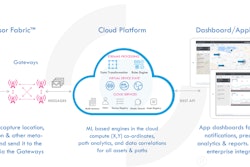
Symphony RetailAI, the leading global provider of artificial intelligence-enabled decision platforms, solutions and customer-centric insights that drive validated growth for retailers and CPG manufacturers, announced the findings of its Marketing 360: Personalizing the Path to Purchase survey. The report explores the current state of personalized marketing in fast-moving consumer goods in the U.S. and the value of AI-enabled, real-time marketing automation for driving profitability and customer retention.
The survey findings highlight the challenges retailers face when aggregating and leveraging the omnichannel consumer data required to create a real-time targeted marketing strategy, as well as the capabilities retailers are prioritizing to make it possible.
Personalized marketing requires a 360-degree customer view. The survey found that more than one-third of U.S. retailers consider the establishment of a usable set of data-backed customer insights a personalized marketing challenge. Meanwhile, more than two-thirds are open to changing their personalized marketing and campaign management solution provider for faster, easier aggregation of customer data for targeting and analysis. Retailers are rightly focusing on developing a single, comprehensive view of each customer’s behavior in order to cater to them with unique offers and promotions.
However, with the explosion of available omnichannel data, retailers struggle to collect the most valuable data from disparate business systems in a central repository. In addition, actionable analysis often requires extensive resources. In fact, the survey found that, given the importance and complexity of this process, reducing the effort needed to manage marketing campaigns would be a reason for 44 percent of retailers to switch solution providers.
Marketing automation reaches customers with personalized offers in real time. To address this challenge, 60 percent of retailers named marketing automation as one of three essential personalized marketing initiatives. Marketing automation is emerging as a requirement for marketers, with 48 percent claiming that providing precise messages to consumers at exactly the right time based on their channel preferences is an approach marketers will use over the next 12-24 months.
In practice, the complexity and time requirement to manually sort through omnichannel data have led nearly half of the retailers surveyed to pursue turnkey solutions that push only the most relevant offers available through the optimal channel. Retailers usually know who their best customers are, but traditional systems and processes do not provide the 360-degree view of behavior across all channels required to anticipate future customer needs or reach them in real time where they are.
In fact, while 74 percent of retailers have become broadly adept at personalized digital marketing strategies such as social media or retargeting, only 18 percent claim an advanced ability to personalize mobile content. With mobile commerce on the rise and effective communications creating major impact on in-store sales conversions, leveraging this channel is essential to business goals.
Artificial intelligence optimizes value of customer data to support business goals. “To meet business goals and address the demands of data-driven personalized marketing, we’re seeing that marketers are turning their attention to the value of AI-enabled personalized marketing solutions,” said Mike Bristol, vice president personalized marketing, Symphony RetailAI. “These systems can aggregate personal data from across the omnichannel spectrum and create predictive behavior models that lend a tremendous advantage to retailers in executing strategic campaigns. It all becomes smarter, faster and much cheaper to do.”
Machine learning foundations allow retailers to refine and optimize campaigns in real time to address evolving marketplace signals ranging from shifts in consumer attitudes to aggressive competitor promotions to fluctuating supplier collaboration and support. Creating more effective and responsive campaigns that protect and increase the value of investments in other parts of the business make personalized marketing a key component of driving margins and profitability in 2018 and beyond.















